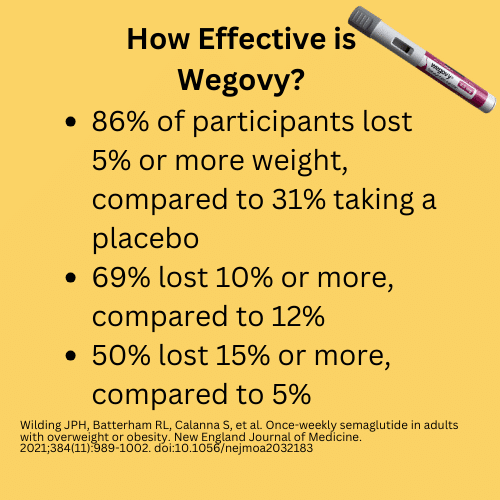Wegovy and Menopause: A Game Changer?
Wegovy® has been making waves for its promising results in tackling obesity. As the first drug of its kind, Wegovy has proven clinically effective in facilitating significant weight loss.
Table of Contents
ToggleBut, can it help women who gain weight during perimenopause and menopause? In this blog, we will discuss the potential of Wegovy in addressing weight gain during menopause.
Disclaimer: This blog post is for informational purposes only. Discuss your specific needs with your healthcare provider.
What is Wegovy?

Wegovy is a medicine for adults with obesity or overweight as well as a weight-related condition.
The FDA approved it in June 2021, and it’s only available as an injection right now.
How Does it Work?
Wegovy belongs to a class of drugs called glucagon-like peptide-1 (GLP-1) receptor agonists. These drugs work by mimicking the effects of GLP-1, a hormone that regulates appetite and glucose metabolism. It also slows down the speed at which food passes through your body, known as gastric emptying.
In simple terms, it helps make you feel full for a long period of time. Then, when you start eating, you feel satisfied sooner.
On top of that, it helps regulate blood glucose and insulin, which plays a role in weight management for many menopausal women.
How Effective is Wegovy?
Research shows that Wegovy can help facilitate significant weight loss compared to a placebo.
In a 68-week study:

- 86% of participants lost 5% or more weight, compared to 31% taking a placebo
- 69% lost 10% or more, compared to 12%
- 50% lost 15% or more, compared to 5%
Causes of Menopause Weight Gain
Several changes that start during the transition to menopause contribute to weight gain. It’s not solely due to a poor diet or lack of exercise, but rather a combination of various factors.
Age and menopause make it harder to lose weight by causing muscle loss and increased body fat. The hormonal changes during menopause can also contribute to weight gain.
Next, lifestyle factors, like increased stress and lack of time for self-care, can also hinder weight loss.
Moreover, sleep issues — common among women over 40 — can disrupt the hormones that regulate hunger and appetite. As a result, women may eat more and crave more high-sugar, high-fat foods, leading to weight gain.
Genetics and family history can also influence how your body stores fat and responds to hormonal changes during menopause.
Keep in mind that this is not a complete list of why women gain weight during menopause, and it can vary from person to person.
Can Wegovy Help with Menopause Weight Gain?
No specific research explores the use of Wegovy by menopausal women. However, studies have shown that this medication is effective for weight loss.
Let’s break down how Wegovy can potentially aid with weight loss.
Want to view a video instead of reading?
Decreases Hunger and Appetite
Not enough sleep and hormonal changes in menopause can make you more hungry, crave high-calorie foods, and feel less full.

Wegovy makes you feel full faster and encourages you to eat less by helping to regulate the hormones responsible for hunger and appetite.
Anecdotal evidence from my own clients and Facebook groups suggests that cravings for sugar and alcohol decrease.
A 2017 study supported these observations by suggesting that taking semaglutide results in fewer cravings and a lower preference for fatty, high-calorie foods.
Decreased Insulin Resistance
Let’s not forget that this medication is a variation of Ozempic, which is designed to treat type 2 diabetes. Hence, it’s expected to decrease insulin resistance, which plays a role in weight gain.
Slow Gastric Emptying
We all know that the rate at which food leaves our stomach affects our feeling of fullness and hunger. The slower the rate, the more satiated we feel. GLP-1 medications can slow down gastric emptying, resulting in a decreased appetite.
Side Effects and Considerations for Menopausal Women
Constipation

This is a common side effect of weight loss medications. The issue is that constipation is common for women during this period of life.
So, it’s very likely that using this weight loss method can exacerbate constipation.
Other GI Symptoms
Both weight loss drugs and menopause can worsen GI symptoms like nausea and diarrhea.
Undernutrition
Malnutrition poses a serious concern for individuals taking semaglutide, as some of them consume such severely limited amounts of food. Obtaining sufficient calories or nutrients becomes very difficult, especially when one does not carefully select foods.
Serious Side Effects
Some of the serious problems that can result from taking weight loss drugs are pancreatitis, gallbladder, and kidney issues. They are less common but still possible. Thus, it’s important to know the symptoms associated with these medications and contact your healthcare provider if you suspect any of these issues.
Furthermore, hypoglycemia (low blood sugar) can occur, especially among those taking other medications to lower blood glucose. Your doctor might need to adjust your medication to match your food intake and other aspects of your health.
Depression or thoughts of suicide have also been reported. This is important to consider, as many menopausal women report depression and other mental health issues.
It’s essential that you are monitored by a healthcare provider while taking any weight loss medication. Also, be aware of the potential side effects, and don’t hesitate to contact your doctor if you have any unwanted symptoms.
Weight Gain After Stopping Wegovy
Regaining lost weight after stopping weight loss medication is a common issue. One study reports that participants regained 75% of the weight loss a year after stopping the drug.
Costs
Weight loss medications are often not covered by insurance and can be very costly. Similar medications — Ozempic and Mounjaro — are only covered for those with type 2 diabetes.
Where to Get Wegovy
Wegovy is a prescription medication. Thus, you need a healthcare provider to provide the prescription. Your primary care physician might or might not be familiar with these medications, but it’s worth asking.
There are groups that specialize in obesity medicine and who are more familiar with the prescription and the management of weight loss medications.
An example of such a group is Sequence, a virtual obesity medicine clinic that offers consultations and prescription services online. Their team of physicians, dietitians, exercise experts, and care managers provide the support you need on this journey.
Generic and Compound Semaglutide
At the time of writing this article — late 2023 — there are no generic versions of this medication. The generic versions will become available in the future, but it might take a decade.
What many people are doing is using medications they obtain from compound pharmacies. I am concerned that these “weight loss medications” have not been evaluated for safety or efficacy.
My Expert Opinion
Weight loss medications like Wegovy can provide a very effective tool for individuals struggling with excess weight. However, it’s important to remember that these drugs are not magic pills. For long-term success, individuals should always combine them with a healthy diet and regular exercise.
Moreover, consulting with a healthcare provider before starting any weight loss medication is crucial. They can assess your individual health status and determine if you’re a good candidate for the medication.
To optimize your weight loss, especially if you are in menopause, it’s essential that you exercise. Combining cardiovascular exercises with strength training and flexibility exercises provides the best short- and long-term success.

Dr. Su-Nui Escobar, a Registered Dietitian/Nutritionist in Miami, FL, is dedicated to empowering women in perimenopause and menopause to live healthier, more satisfying lives.
With a doctorate in clinical nutrition from the University of North Florida, she has expertise in menopause and weight loss, including the unique challenges faced by those on weight loss medications.
Su-Nui’s passion for her field is evident in her previous role as the Academy of Nutrition and Dietetics spokesperson.


